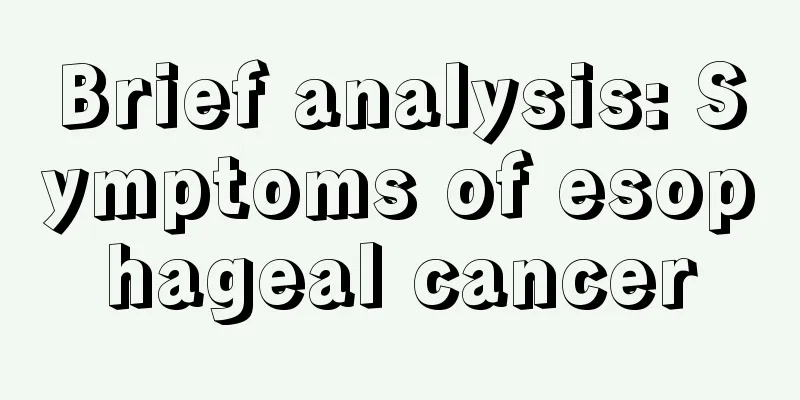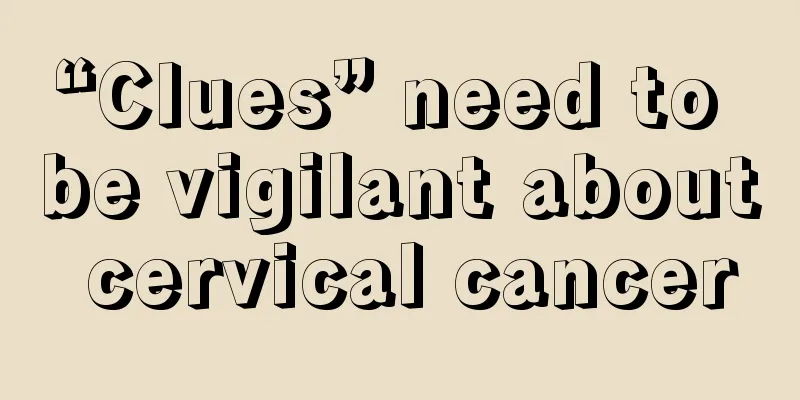Brief analysis: Symptoms of esophageal cancer

|
Esophageal cancer is entering our country with high morbidity and mortality. Esophageal cancer is more common in men over 40 years old. At present, the male-female morbidity ratio is 31. Esophageal cancer is the same as other tumors. The early symptoms are not obvious. When obvious symptoms appear, it is already in the middle and late stages, and the best time for treatment has been missed. How can patients find abnormal conditions by themselves and seek medical treatment in time? The symptoms of esophageal cancer summarized by experts based on their clinical experience are as follows: 1. Pain behind the sternum of the patient. Sometimes the pain can radiate to the back or throat. Pain behind the sternum or chest discomfort is also a common symptom. This is because the cancer has invaded the esophageal wall. Severe pain indicates that the cancer has invaded or compressed the pleura and nerves. 2. Reflux If the tumor is located high, esophageal reflux often occurs when swallowing difficulties worsen. Then food can flow back into the throat. 3. After several months of dysphagia, the patient gradually develops into food obstruction, with the main feature of persistent and progressive dysphagia. At the beginning, the patient only feels discomfort or obstruction when food passes through. At the beginning, the patient cannot swallow solid food, and then can only swallow liquid food. Finally, the patient cannot eat at all or suffers from obstructive vomiting after eating. The location of the obstruction feeling in the patient is generally consistent with the location of the cancer. 4. In the late stage, symptoms of cachexia such as severe dehydration, weight loss, and anemia may be seen. 5. Hoarseness of varying degrees may occur; when the tumor invades the phrenic nerve or the recurrent laryngeal nerve, hiccups or diaphragmatic paralysis may occur; when the tumor grows to the point of compressing the trachea, shortness of breath and dry cough may occur; when the aorta is eroded, massive bleeding may occur; when complicated by esophageal tracheal or esophageal bronchial fistula, choking and respiratory distress may often occur when swallowing liquids or eating. Warm reminder: The content of this website is for reference only and is not used as a basis for diagnosis or medical treatment. If you have any other questions, you can also consult our online experts and we will serve you wholeheartedly. Feihua Health Network has always been by your side and paid attention to your health. I wish you good health and happiness! Esophageal cancer http://www..com.cn/zhongliu/sda/ |
<<: What are the common treatments for laryngeal cancer?
>>: What are the signs of laryngeal cancer in the late stage?
Recommend
7 major misunderstandings of couples preparing for pregnancy
Are you really ready to be a parent? Being a pare...
What will happen if the virus level is high?
The big three positive virus is a very common liv...
What is the best way to treat corneal leukoplakia
The cornea is the most important part of the eye....
Should babies take fish oil or cod liver oil
We all know about cod liver oil, and many people ...
What are the symptoms of chronic liver cancer? Revealing the three major symptoms of chronic liver cancer
Chronic liver cancer is a frightening disease bec...
Can tea make eyelashes longer?
Everyone wants to have long eyelashes, especially...
What is nasopharyngeal carcinoma and what are the nursing routines?
What is nasopharyngeal cancer? What are the routi...
What to do about edema caused by radiotherapy for nasopharyngeal carcinoma
What should I do if nasopharyngeal carcinoma edem...
How to stop overeating
Many people will overeat in their lives, which is...
Are skin care products containing niacinamide good?
Niacinamide is a common water-soluble vitamin B n...
Staging of primary liver cancer
The onset is often insidious. Liver cancer is oft...
Is it better to do iodine 131 treatment for thyroid cancer as early as possible? What are the benefits and harms of iodine 131 treatment for thyroid cancer?
No, it is generally best to do treatment one mont...
Can thyroid cancer be cured without surgery?
Thyroid cancer may not be cured without surgery. ...
What is the nemesis of visceral fat
If you want to eliminate visceral fat, it is defi...
What are the dangers of early lung cancer
What are the hazards of early lung cancer? Lung c...









